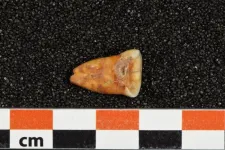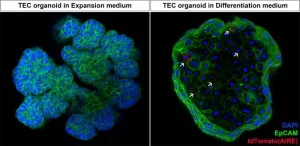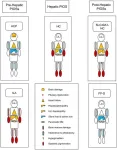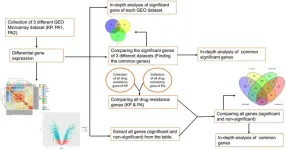More plants on the menu of ancient hunter-gatherers
Isotopic evidence reveals surprising dietary practices of pre-agricultural human groups in Morocco
2024-04-29
(Press-News.org)
Conducted by an international team of scientists from the Max Planck Institute for Evolutionary Anthropology (Leipzig, Germany), Géoscience et Environnement Toulouse (Toulouse, France), and the Institut National des Sciences de l’Archéologie et du Patrimoine (Rabat, Morocco), the study examines the diet of individuals associated with the Iberomaurusian culture discovered in the cave of Taforalt, Morocco. Using a comprehensive multi-isotopic approach, including zinc and strontium isotope analysis in dental enamel, carbon, nitrogen, and sulfur analysis in collagen, as well as amino acid analysis of human and faunal remains, the researchers uncovered surprising insights into ancient dietary practices.
The study's major conclusions clearly show that the diet of these hunter-gatherers included a significant proportion of plants belonging to Mediterranean species, predating the advent of agriculture in the region by several millennia. Archaeobotanical remains found at the site, such as acorns, pine nuts, and wild pulses, further support this notion. Moreover, the study suggests that plant foods were also introduced into infant diets and may have served as weaning products for this human population. This finding has significant implications, as it suggests the potential for earlier weaning practices in pre-agricultural communities compared to previously thought norms for hunter-gatherer societies.
Complex dietary practices of pre-agricultural societies
This challenges the prevailing notion of a diet heavily based on animal protein among pre-agricultural human groups and raises questions about the lack of agricultural development in North Africa at the beginning of the Holocene. Zineb Moubtahij, first author of the study, explains: “Our findings not only provide insights into the dietary practices of pre-agricultural human groups but also highlight the complexity of human subsistence strategies in different regions. Understanding these patterns is crucial to unraveling the broader story of human evolution."
Furthermore, this study is the first to use zinc isotopes preserved in enamel to determine the diet of ancient populations in Africa. North Africa is a key region for the study of human evolution and modern human dispersal. Having a tool that allows us to further explore human diet deep in time in this region will provide valuable insights into human dietary patterns and adaptability in different environments.
Moving forward, the research team hopes to explore additional Paleolithic sites in North Africa and use innovative techniques to gain a deeper understanding of ancient dietary practices and their implications for human evolution.
END
[Attachments] See images for this press release:


ELSE PRESS RELEASES FROM THIS DATE:
2024-04-29
WASHINGTON – A new study examining the role of aspirin in breast cancer treatment reveals critical issues related to health equity and aging that have broad implications for cancer and other disease intervention trials, say researchers from Georgetown University’s Lombardi Comprehensive Cancer Center. They outline their concerns in an editorial accompanying the study’s findings published April 29 in the JAMA (“The Aspirin Conundrum: Navigating Negative Results, Age, Aging Dynamics and Equity”).
The ...
2024-04-29
HOUSTON and ALBUQUERQUE, N.M. ― A national study led by researchers at The University of Texas MD Anderson Cancer Center and The University of New Mexico (UNM) Comprehensive Cancer Center found major gaps in breast, cervical and colorectal cancer screening use in Federally Qualified Health Centers (FQHCs) in the U.S., relative to overall screening rates in the country.
The findings, published today in JAMA Internal Medicine, revealed screening use in FQHCs was 45.4% for breast cancer, 51% for cervical cancer and 40.2% for colorectal cancer, compared to cancer screening rates in the general American population of 78.2%, 82.9% and 72.3%, respectively.
“FQHCs ...
2024-04-29
Natural scenery typically conjures up positive emotions and a sense of wellbeing for most individuals. A new study by INSEAD shows that verdant views can also nudge people to pick healthier food.
Published in Communications Psychology, a new journal by Nature, the study suggests that spending time in a natural setting, such as walking in a park (vs. on city streets), or simply viewing greenery outside the window (vs. an urban view), leads people to make healthier food choices afterward.
“Our ...
2024-04-29
A modified pacifier and AI algorithms to analyze the data it produces could determine if newborns are learning the proper mechanics of nursing, a recent study shows.
Specifically, the researchers from the University of California San Diego measured if babies are generating enough suckling strength to breastfeed and whether they are suckling in a regular pattern based on eight independent parameters.
The results, published in the April 18 online edition of IEEE Journal of Translational Engineering ...
2024-04-29
Researchers from the Organoid group have developed a new organoid model that can be used to study the thymus. The organoids, derived from mouse thymus tissue, specifically model thymic epithelial cells (TECs). These cells are responsible for training the T cells of the immune system to properly respond to pathogens. It is the first laboratory model that enables long-term culture of TECs, which presents new opportunities to study their function. Ultimately, this could also bring new insights into the treatment ...
2024-04-29
Background and Aims
The clinical introduction of hepcidin25 (Hep25) has led to a more detailed understanding of its relationship with ferroportin (FP) and divalent metal transporter1 in primary iron overload syndromes (PIOSs). In 2012, we proposed a classification of PIOSs based on the Hep25/FP system, which consists of prehepatic aceruloplasminemia, hepatic hemochromatosis (HC), and posthepatic FP disease (FP-D). However, in consideration of accumulated evidence on PIOSs, we aimed to renew the classification.
Methods
We ...
2024-04-29
INDIANAPOLIS – Clinical trials are constantly being designed and study participants enrolled to determine if medical treatments and therapies are safe and effective. Much has been written about the importance of including diverse populations in these trials.
However, the nearly 1.4 million individuals who live in the 15,600 nursing homes across the U.S. have been largely left out of clinical trials, despite the prevalence of such common conditions as hypertension, depression, diabetes and Alzheimer’s disease in this population.
A commentary by faculty of Regenstrief Institute, Indiana University, UCLA ...
2024-04-29
Background and objectives
Infectious diseases caused by pathogenic strains of bacteria are a global cause of morbidity and mortality. Hospital-acquired infections caused by Klebsiella pneumonia and Pseudomonas aeruginosa were found vulnerable during the COVID-19 pandemic. They are also responsible for the onset of certain life-threatening infectious diseases such as cystic fibrosis, endocarditis, bacteremia, and sepsis. Looking into the importance of these two superbugs there is a strong need for extensive comparative differential gene expression analysis ...
2024-04-29
WASHINGTON, DC – (April 26, 2024) The effects of quantum mechanics—the laws of physics that apply at exceedingly small scales—are extremely sensitive to disturbances. This is why quantum computers must be held at temperatures colder than outer space, and only very, very small objects, such as atoms and molecules, generally display quantum properties. By quantum standards, biological systems are quite hostile environments: they’re warm and chaotic, and even their fundamental components—such as cells—are considered very large.
But ...
2024-04-29
New York, NY [April 29, 2024]—Miriam Merad, MD, PhD, a world-renowned immunologist, has been appointed Dean for Translational Research and Therapeutic Innovation of the Icahn School of Medicine at Mount Sinai. The appointment reaffirms Icahn Mount Sinai’s commitment to pioneering medical progress and catalyzing the rapid advancement of research innovation.
Dr. Merad, the Mount Sinai Professor in Cancer Immunology, will also continue to serve as the founding Chair of the Department of Immunology and Immunotherapy, Director of the Marc and Jennifer Lipschultz Precision Immunology Institute, and Director ...
LAST 30 PRESS RELEASES:
[Press-News.org] More plants on the menu of ancient hunter-gatherers
Isotopic evidence reveals surprising dietary practices of pre-agricultural human groups in Morocco









